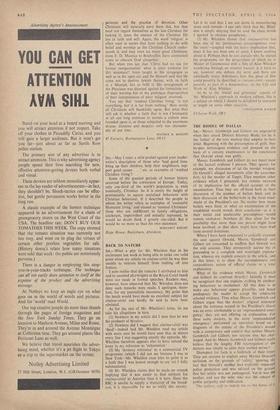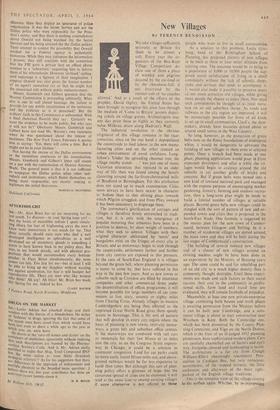THE RIDDLE OF DALLAS SIR,—Messrs. Gombrich and Gilbert are ungrateful
when they attack District Attorney Wade, for he is the 'father' of the very method they employ in their letter. Beginning with the presumption of guilt, they by-pass intransigent evidence and proceed on the basis of a cursory examination to the conclusion that Oswald alone was guilty.
Messrs. Gombrich and Gilbert do not reject most of the factual evidence 1 present. They ignore, for example, my discussion of (a) the murder weapon; (b) Oswald's alleged movements after the assassina- tion; (c) the murder of Tippit. They mention other evidence which I presented, but remain unaware of its implication for the official account of the assassination. Thus they are off-hand both in their discussion of the number of bullets fired, and in their discussion of the bullet-hole in the front wind- shield of the President's car. No matter how many bullets were fired, or what an examination of the windshield would reveal, their conclusion—as it is their initial and unalterable presumption—would remain unshaken. Nowhere do they allow for the possibility that more than one person might have been involved, or that shots might have been fired from several directions.
Where I have been concerned to critically examine the case against Oswald, MessrS. Gombrich and Gilbert are concerned to reaffirm that Oswald was the sole assassin. They erroneously accuse me of pretending to a complete and watertight explana- tion, whereas my explicit concern in the article, and in this letter, is to show the incompleteness and contradictory nature of official claims to a total explanation.
What of the evidence which Messrs. Gombrich and Gilbert do confront directly? Initially it must be recognised that one explains nothing by attribut- ing behaviour to excitement. All this does is to make any behaviour appear plausible, and hence predisposes the reader to accept the arbitrarily selected evidence. Thus when tvlessrs. Gombrich and Gilbert argue that the doctors' original statement about the entrance wound in the President's throat was an error attributable to an 'unprecedented emer- gency,' they are not offering an explanation. For
these same doctors, in the same 'unprecedented emergency,' performed an operation based on a diagnosis of the nature of the President's wound
with a competence and control that neither Messrs• Gombrich and Gilbert, nor anyone else, has chal- lenged. And do Messrs. Gombrich and Gilbert really believe. that the lengthy FBI interrogation of the doctors was simply to calm their excited nerves?
Disrespect for facts is a hallmark of their letter• They are anxious to explain away Marina Oswald's seclusion on the grounds of 'safety,' ignoring the
fact that Oswald's mother had explicitly requested police protection and was refused on the ground that her safety was not endangered. Yet it was the mother, and not the wife; who was the subject of public antipathy and vilification. ‘, The authors seek to impale me on the horns of 3
dilemma. Here they display an ignorance of police organisation. It was the Secret Service and not the Dallas police who were responsible for the Presi- dent's safety; and thus there is nothing contradictory about Oswald not being watched (by the Secret Service) and his being arrested (by the Dallas police). Their attempt to contest the possibility that Oswald worked for a Federal agency is pathetically , humorous. While they may juxtapose the information I present, they still conclude with the contention that the FBI gave a private (not an office) phone number to a 'subversive,' requesting him to inform them of his whereabouts. However 'civilised,' calling- card espionage is a figment of their imagination. I suppose Oswald was also given the licence number of an agent's unmarked car so that he might hail the occasional ride without public embarrassment.
Messrs. Gombrich and Gilbert question that the Warren Commission is proceeding arbitrarily. What else is one to call closed hearings, the failure to provide for any public examination of the testimony and the evidence as it is presented? But the authors' faith in this Commission is unbounded. With a final rhetorical flourish they say: 'Certainly we want the evidence to be made public, but who says it will not be?' Obviously Messrs. Gombrich and Gilbert have not read Mr. Warren's own statement when he was questioned about the release of testimony. The New York Times, February 4, quotes him as saying: 'Yes, there will come a time. But it might not be in your lifetime.'
Not having the excuse of the Dallas environment or the immediate confusion of the assassination, Messrs. Gombrich and Gilbert's letter still stands on a par with the ratiocination of District Attorney Wade. The general point is that it is not sufficient to scapegoat the Dallas police when other indi- viduals and institutions, which flatter themselves on being more responsible, are merely seeking to legitimate the initial distortions.
Oakland, California
MORDECAI IIRIENBERG



































 Previous page
Previous page